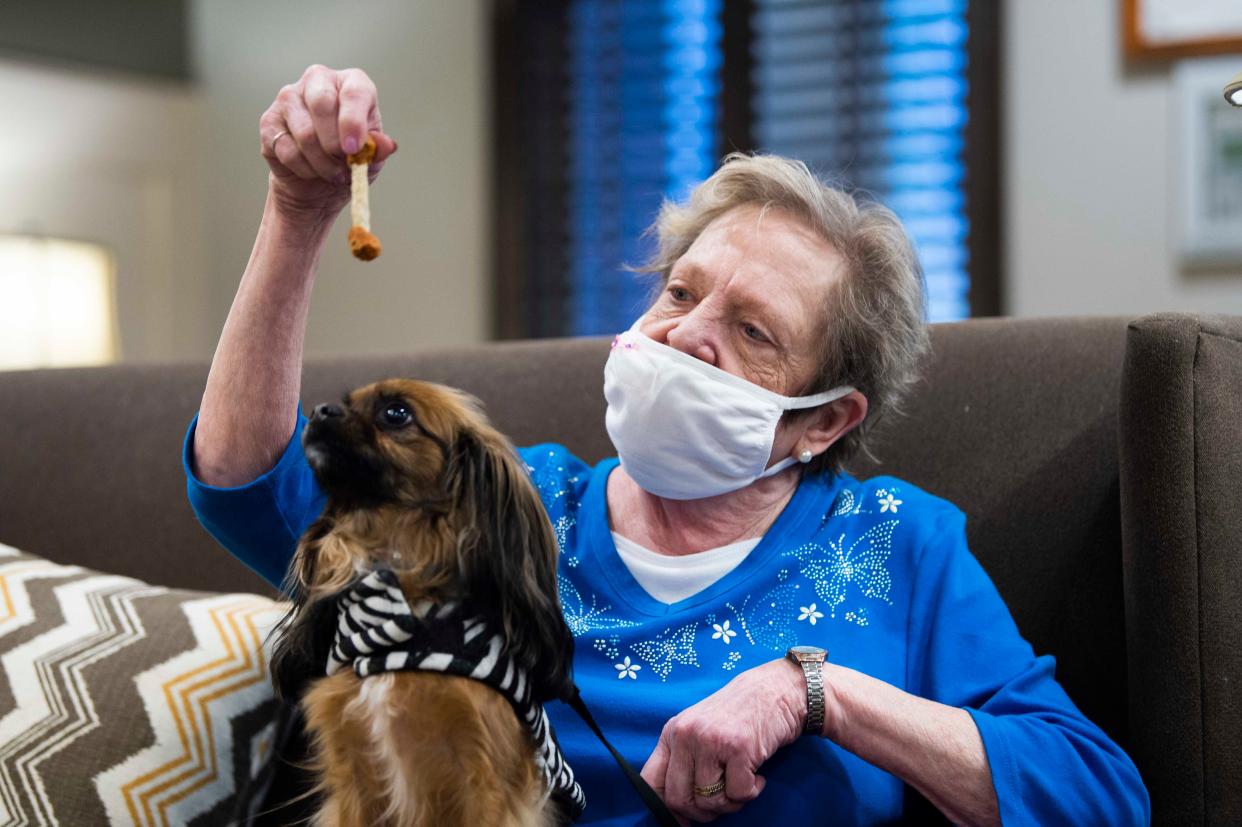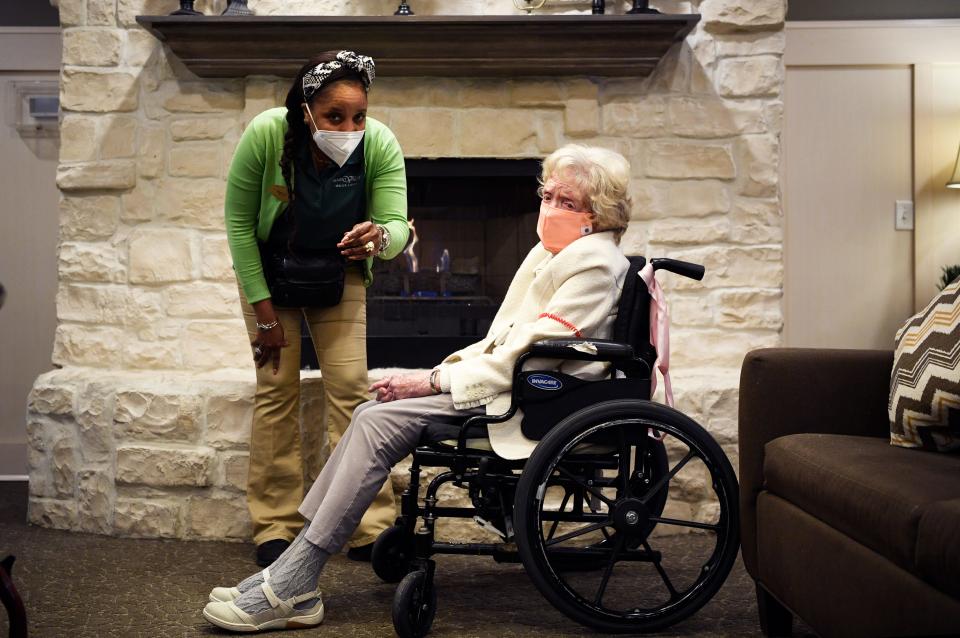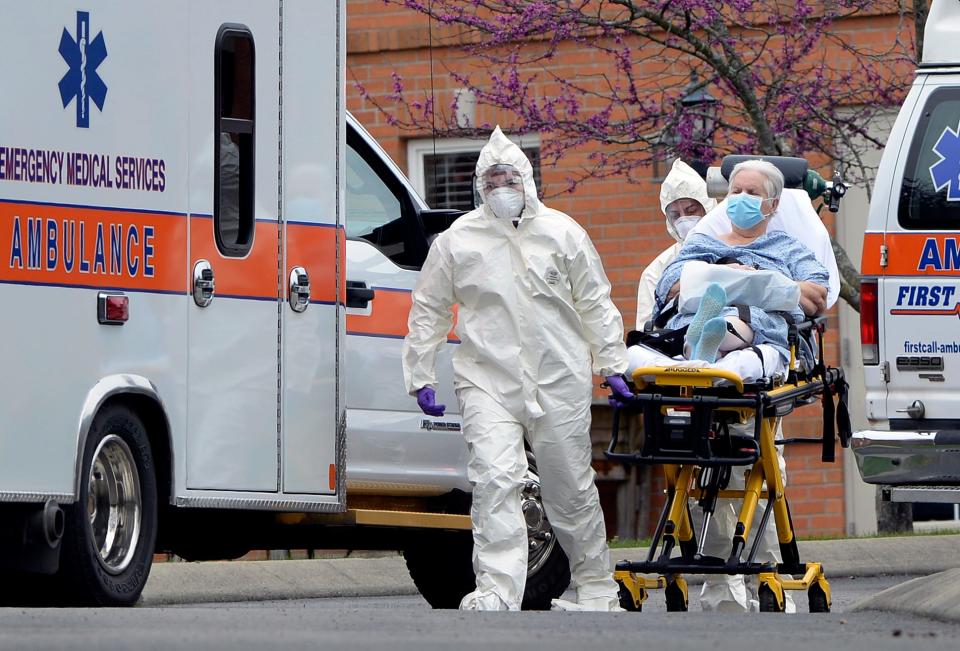COVID-19 infections increase tenfold among Tennessee nursing home residents

One year after the coronavirus ravaged Tennessee nursing homes and killed older residents faster than any other population, the skyrocketing virus is besieging the facilities again, rekindling fear of the darkest days of the pandemic.
New outbreaks in nursing homes have not led to a dramatic rise in resident deaths, likely because of high vaccination rates. But it is too soon to rule out a future death spike, said one of Tennessee’s top public health officials.
Dr. John Dunn, Tennessee state epidemiologist, said omicron may cause less sickness in many patients, but severe consequences of the new variant will most likely occur in nursing homes and similar long-term care facilities.
“Our elderly populations, including those in long-term care facilities, are still our most medically fragile folks, not only with COVID and with omicron but with other diseases that could circulate,” Dunn said. “We are going to continue to take precautions among this group because the outcomes will be worse.”
Despite these concerns, Tennessee government leaders have not reinstated any guidelines on visitation, dining or group activities used earlier in the pandemic to combat the virus in nursing homes. Bill Christian, a spokesman for the Department of Health, said he was “unaware of any discussion” about reinstating those guidelines.
CORONAVIRUS: In Tennessee hospitals, omicron sparks the worst staffing crisis of the pandemic
VACCINATION: Under the weight of omicron, Tennessee vaccines bend but don't break
More than 1,500 new infections in a week; more staff sick than ever
Tennessee reported more than 500 new infections among nursing home residents and about 1,000 new infections among staff in the week ending on Jan. 9, according to the Centers of Disease Control and Prevention.
Resident infections are at the highest point since January 2021, before vaccinations took hold, and are 10 times higher than one month prior.
Infections among staff are now higher than ever and approximately 17 times higher than they were a month ago.
The new outbreaks are not isolated to any region of the state and are in both small and large facilities. Outbreaks have been detected in more than 200 facilities scattered across the state, with clusters in every metropolitan area, according to state records.
Despite the outbreaks, nursing homes have not reported a recent rise in virus deaths. CDC data shows Tennessee nursing homes reported 16 COVID-19 deaths in the week ending on Jan. 9, up from eight one month earlier.
For comparative purposes, when infections were at this same level one year ago, nursing homes reported 119 deaths.
This infection surge also is not specific to nursing homes, nor is it unique to Tennessee. Coronavirus is in overdrive across the globe. In the U.S., long-term care facilities are reporting infection surges in almost every state. These explosive increases are a result of the increased transmissibility of the omicron variant.
PANDEMIC: COVID-19 still surging in Tennessee, but experts predict an omicron peak approaches
Nursing homes were prioritized for vaccination. For booster shots? Not so much.
Nursing homes may also be more vulnerable than before because of waning antibodies among residents and staff who didn’t get booster shots, which appear to be critical to fending off omicron.
About 83% of residents and 73% staff in Tennessee nursing homes are fully vaccinated, but only 44% of residents and 15% of staff are boosted, according to CDC data. Staff are boosted at a slightly lower rate than Tennesseans overall, despite the risk the virus poses to nursing home residents.
Nursing homes were once the top priority for vaccination. When the first vaccines became available last winter, the initial doses were given to residents through a heavily orchestrated partnership between the federal government, state health officials and large pharmacies.
Months later, when it came time for booster shots, nursing homes were left to tackle the logistics themselves. Facilities were instructed to reach out to pharmacies directly to arrange shots, and contact the state government for help only if these efforts failed.

Many facilities weren't able to coordinate with pharmacies, so residents and staff ventured out to get boosters themselves, said Jesse Samples, executive director of the Tennessee Association for Assisted Living.
"The boosters were totally different. The facilities were left up to their own accord," Samples said. "While some facilities might have been able to work with a pharmacy to give boosters to their NH residents, most had to administer the boosters themselves after making arrangements to get the supplies. Many pharmacies were simply to overwhelmed to provide the same level of assistance as the original vaccines."
Early in the pandemic, before vaccines became widely available, nursing homes were the front lines of the battle against coronavirus.
Many of the deadly outbreaks in the first months of the pandemic occurred in nursing home facilities in Tennessee and across the nation. The combination of elderly, vulnerable residents, living together in tight quarters, created ideal conditions for virus to kill.

In the first 11 months of the pandemic, residents of long-term care facilities accounted to just 2% of all coronavirus infections in Tennessee but about 22% of all virus-related deaths.
IN-DEPTH: At a Tennessee nursing home, 23 deaths, poor handwashing and a one-star health rating
The deluge of death did not end until the arrival of the vaccines in the winter of 2020.
By early March, just about every nursing home resident who wanted a vaccine had received one and infections among this group fell by 90%. Infections levels in nursing homes remained nominal through the summer of 2021, then increased some in the fall but less so then in the general population.
By the delta surge, nursing homes appeared to be a weak spot no longer.
“It was getting to the point where, because of what was happening the community, it was almost safer in a long-term care community,” Samples said. “The vaccination rates were higher, even though they might not have been as high as some people would have liked, but they were still higher.”
Samples said lack of recent deaths made it clear that the new infection surge was dramatically different than those in the past. But the nursing home industry was still frustrated after being so successful at warding off the virus for the bulk of 2021.
“We’ve been dealing with it for nearly two years,” Samples said. “To see these cases skyrocket, it’s tough on morale for sure.”
Brett Kelman is the health care reporter for The Tennessean. He can be reached at 615-259-8287 or at brett.kelman@tennessean.com. Follow him on Twitter at @brettkelman.
This article originally appeared on Nashville Tennessean: COVID-19 infections increase tenfold in Tennessee nursing homes

